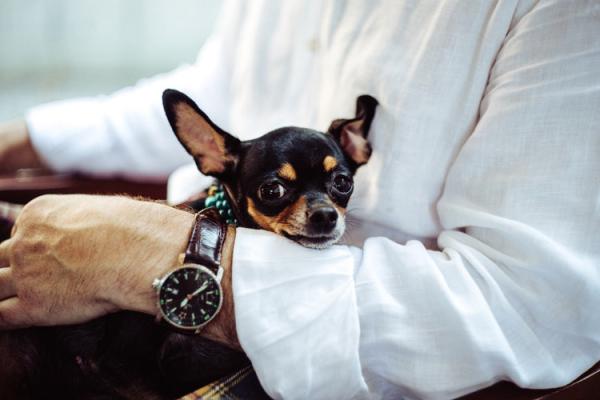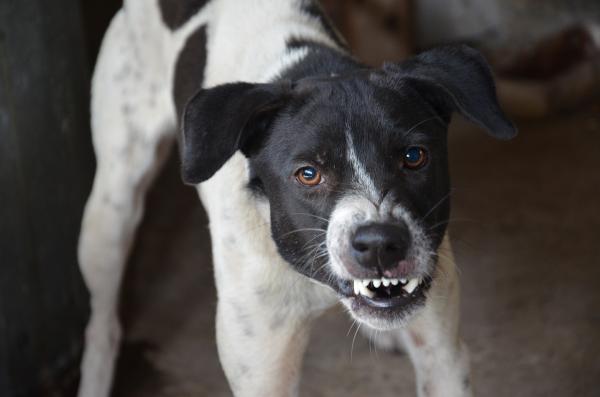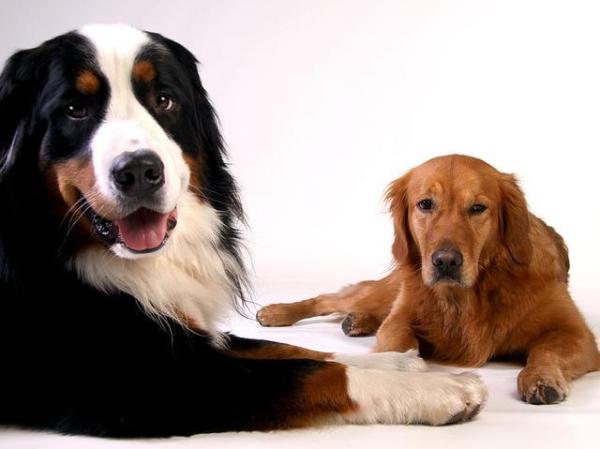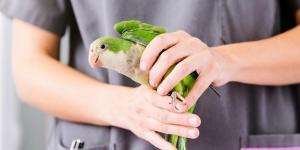Signs of Jealousy in Dogs



See files for Dogs
Jealousy in dogs is not necessarily an emotion of which dogs are capable. Humanizing a dog is dangerous as it can lead to improper care, even if a guardian is well intentioned. By ascribing human emotions like jealousy, we may mask the true underlying problem and fail to address it. With this context, it is possible a dog will exhibit behaviors which are very similar to being jealous. These are behaviors which relate to other members of the family, whether it is other dogs, companion animals or even humans. There usually specific situations which lead to perceived jealousy behaviors, although the underlying cause is often more related to their treatment and care.
At AnimalWised, we look at both the signs of jealousy in dogs and how to stop it. We look at the situations and underlying causes which can lead to jealous behavior so we can better know how to address them.
Do dogs get jealous?
Dogs can exhibit behaviors that appear to be jealousy, but their emotional experiences are not entirely understood. The term ‘jealousy’ may not accurately capture what is happening. Dogs are social animals that form strong bonds with their human caregivers and can react to changes in attention or affection. Here are some common behaviors that may resemble jealousy in dogs:
- Attention-seeking: when a dog perceives that their owner is giving attention or affection to another person or animal, they may seek attention themselves. This can include behaviors like whining, pawing, or nudging the owner to regain their focus.
- Resource insecurity: dogs can be protective of their resources, such as toys, food, or even their owner's attention. They may exhibit guarding behaviors when they perceive a threat to what they value.
- Competitive behavior: dogs in multi-pet households may compete for their owner's attention. This can lead to behaviors that may seem like jealousy, such as pushing another pet away or trying to claim the owner's lap.
- Anxiety: some dogs may become anxious or stressed when they feel neglected or left out. This can manifest as restlessness, barking or other signs of distress. Learn more with our article on separation anxiety in dogs.
It's important to note that these behaviors are not necessarily indicative of jealousy in the way humans experience it. Instead, they may reflect a dog's desire for attention, social interaction or resource protection. Dogs do not possess complex human emotions like jealousy, but they can react to changes in their environment or social dynamics.
While on this topic, you may also want to know more about canine possessiveness with our article on why is my dog possessive over toys?
Signs of a jealous dog
While it's important to remember that dogs don't experience emotions like humans do, they can exhibit behaviors that may appear as jealousy or insecurity when they feel their resources or attention are threatened. Here are some signs or behaviors that may be interpreted as jealousy in dogs:
- Seeking attention: a jealous dog may try to get your attention by pawing at you, nudging you or whining when you interact with another person or animal. There are also less obvious signs of attention seeking such as the dog rubbing themselves on the couch.
- Pushing or wedging in: some dogs may physically insert themselves between you and the person or pet they perceive as a rival for your attention.
- Resource guarding: a dog that is feeling possessive of a particular toy, food or even your affections may display resource guarding behavior. This can include growling, snapping or trying to take the item away from the perceived rival.
- Restlessness or agitation: jealous dogs may become anxious or agitated when they feel left out or ignored. They might pace, bark or exhibit signs of restlessness.
- Attention to the rival: a dog displaying jealousy may closely watch the person or animal they see as a competitor for your attention. They stare at them maliciously or monitor their movements closely.
- Withdrawal: in some cases, a dog may react to perceived jealousy by withdrawing or sulking. They might go to a corner or another room, appearing sad or upset.
- Inappropriate elimination: in extreme cases, jealousy or stress can lead to behavioral issues such as the dog urinating or defecating indoors.
It's essential to approach these behaviors with a balanced and positive approach. Punishment or scolding is generally not effective and can exacerbate the problem. Instead, focus on training and socialization to help your dog feel more secure and confident in various situations. Providing each pet with individual attention, exercise, and affection can also help reduce potential jealousy-related behaviors. Consulting with a professional dog trainer or behaviorist can provide specific guidance for your dog's unique needs.

Situations where a dog is jealous
To know the reason why a dog is showing signs of jealous behavior, it is imperative we look at the context. For this reason, there are certain situations where a dog is more likely to develop a jealous attitude. They include:
- Dog jealousy of new dog: this occurs when several dogs live in the same home and the guardian continuously ignores one or pays more attention to another. This may be especially acute when a new puppy enters the home since an older dog may think they are more of a threat. We must differentiate jealousy from territoriality, which is shown only to unknown individuals.
- Dog aggression during pregnancy: it is very common for pregnant women to naturally change routine and daily habits. In these cases, the dog may feel ignored and therefore try to gain lost attention. It is important to progressively prepare a dog for the arrival of a baby. Make sure to never suddenly change their habits and always support your dog positively through this transition. Dogs may seem ‘jealous’ during pregnancy because they become confused by their tutor’s change of scent, hormones or physicality.
- Dog jealous of baby: it is essential to present a dog and baby correctly, consider doing this with the help of a professional. However, if for whatever reason there is a negative association or this presentation has not taken place correctly, behavioral dog problems may arise. This can occur if you scold the dog in the presence of the child, if you do not let the dog approach the baby and/ or if you punish the dog. You can avoid dog jealousy between children and babies through positive reinforcement, the proper guidelines and with the help of a professional.
- Dog jealous of boyfriend or girlfriend: you may have seen one of many YouTube videos of dogs getting jealous when a couple kiss. While many refer to this as ‘jealousy,’ it’s in fact a sign of resource protection. A dog considers its guardian as their security and acts on the the need to protect them. Sometimes, if dogs are incredibly protective of their owners, they may even become aggressive towards the perceived rival.
While these situations can spark jealous behaviors, it is very important to know that these will not be the underlying causes. We explore this further in the next section.
Causes of jealousy in dogs
Although the above situations can present as the dog being jealous, it is not the underlying reason for this behavior. Some dog breeds may have a certain tendency to be protective of their guardians, often due to a history of being employed as a guard dog. Others may be particularly nervous and protective of their resources. However, breed is not the only, nor the most important, factor in dog jealousy.
The following are the factors which most often lead to jealousy in dogs:
- Limited resources: dogs can become jealous when they perceive limited resources, such as their owner's attention, affection or food. This competition for resources can trigger possessive behaviors.
- New family members: the introduction of a new pet, whether it's another dog, a cat, or a human family member, can lead to feelings of jealousy as the established dog may feel threatened by the newcomer. However, this is usually because they have an underlying reason to feel insecure.
- Lack of education: dogs that haven't received proper training and socialization may have difficulty understanding and coping with situations that trigger jealousy. A lack of training can exacerbate behavioral issues. Learn more with our article on basic dog training commands.
- Past experiences: a dog's past experiences can influence their behavior. If a dog has had negative experiences, such as being abandoned or abused, they may develop trust issues and exhibit jealousy or possessive behaviors.
- Inadequate socialization: dogs that haven't been adequately socialized with other dogs or animals during their early developmental stages may struggle to adapt to new social situations, leading to jealousy when confronted with unfamiliar individuals or animals.
- Inadequate exercise and mental stimulation: dogs that do not receive sufficient physical and mental exercise may become frustrated, anxious, and more prone to jealous behaviors.
- Medical issues: certain medical conditions, such as pain or discomfort, can cause behavioral changes that might be interpreted as jealousy. Learn more about the signs of pain in dogs so you can recognize them in your animal.
- Owner's attention: dogs can become jealous if they feel they are not receiving enough attention from their owner. For example, if the owner suddenly starts paying more attention to another pet or person, the dog may react with jealousy.
Now we know the causes and signs of jealousy in dogs and its causes, we see that it can be quite disruptive to the home. For this reason, we look at how to stop a dog being jealous and return peace to the family.

How to stop jealousy in dogs
It is important to reiterate that perceived jealous behaviors in dogs will have some underlying cause. Even of they are a breed which is predisposed to issues such as protectiveness, they should not display behavioral problems if their physical and emotional needs are well met.
To stop jealousy in dogs, we will need to start by taking the relevant safety measures, which includes avoiding direct contact between the dog and the social rival. You can temporarily use a muzzle if necessary, never exceeding 60 minutes. Avoid the use of punishment altogether, as this can further aggravate your dog’s behavior. Instead, control the situation with the use of basic obedience commands and positive reinforcement in dogs.
Jealous dog aggression can be incredibly alarming and dangerous for any dog owner, especially if directed towards a child or baby. In these cases, we recommend consulting a professional canine ethologist, trainer or veterinarian. They will be able to rule out the possibility of a pathology which may be triggering this aggression. A canine ethologist or trainer will be able to help fix this behavior accordingly and start conducting behavior modification sessions.
It is very likely that a professional will:
- Ask you to monitor your dog’s interactions with other individuals.
- Offer advice on how to handle this situation appropriately.
- Apply a set of activities to help improve your relationship with your dog, through positive habits and routines.
In cases where behavioral therapy does not work, it is possible that removal of the dog is necessary. This is especially so if they are aggressive and jeopardize the safety of a child. We also need to ensure the sudden aggression from the dog is not due to another problem. This is why it is so important to speak to a veterinarian.

If you want to read similar articles to Signs of Jealousy in Dogs, we recommend you visit our Behavioral problems category.







